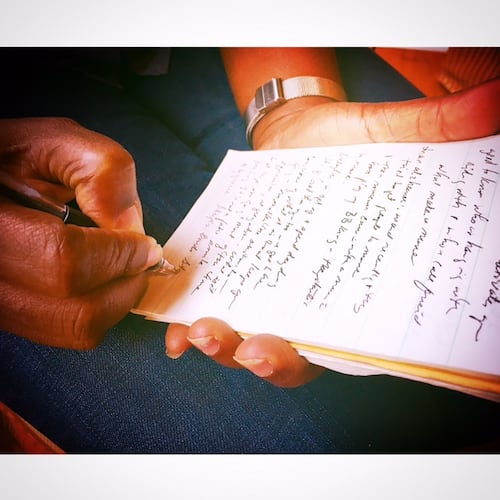More than a decade after Tarana Burke coined the phrase “Me Too” as a way to help women who had survived sexual violence, Courtney Stewart sat watching one woman after another come forward to tell their stories.
Listening, she could feel the anger rising inside. Stewart had her own story.
It’s hard to believe that someone would adopt you and then allow her boyfriend to sexually abuse you, but that’s what happened to Stewart. And so it might not surprise you that for a long time she felt worthless, tainted, and like she would never amount to anything because that’s what they’d drilled into her head and her heart.
The #MeToo movement, following the exposure of the widespread sexual abuse allegations against Harvey Weinstein in October 2017, was spreading like fire as a hashtag on social media. One high-profile celebrity after the other was coming forward to share their story. Gwyneth Paltrow, Ashley Judd, and Uma Thurman, among others.
At just 11 years old, she found inside her the strength to say something. Her adoptive mom, charged with criminal liability and two counts of risk of injury to a child, and the boyfriend, charged with two counts of sexual assault in the first degree, were both convicted and sentenced to years in prison.
Stewart, now 29, would spend the next few years bouncing from one foster home to the next until in 2005 she landed in a good one, a real family who loved her.
“They showed me normalcy,” she said. “I had siblings and loving parents who taught me my worth and how to move forward.”
By the time she’d made her way from Connecticut’s Windsor High School in 2009 and stepped onto the yard of Spelman College, she’d started to heal. If feelings of inadequacy started to invade her psyche, a thick application of purple lipstick always returned her to her happy place. Lipstick made her feel strong, empowered, ready to handle anything thrown her way. Lipstick helped her discover her voice.
Funny how that works but it does.
In 2013, Stewart graduated from Spelman with a degree in political science and then in 2016 received a master’s degree in terrorism and homeland security policy from American University before starting work with the federal government in Washington, D.C.
“I went into public service because I wanted to make a lasting difference in the lives of people who really need it and to ultimately help people in this country to seek justice,” Stewart said. “I am able to do that indirectly, but I’ve also always wanted to have a direct impact.”
Two years later in 2018, she got the chance to do that work in Atlanta working for the Department of Justice.
As Stewart watched the news that day, the parade of women sharing their stories was so unsettling she rose to shower and get ready for bed.
She was removing her lipstick when she saw in it the power she wanted to give to other women, women who like her had been raped and abused, made to feel they didn’t matter.
Credit: Courtest of LipRevolt
Credit: Courtest of LipRevolt
“Lipstick had always been kind of like my own personal protest,” Stewart said. “In environments where women are expected to fit in and not make too much noise, a bold shade of lipstick does the talking for me. At that moment, I thought this is it. This is how I’m going to make a difference.”
And so last week, on Women’s Equality Day, she began, launching LipRevolt, a line of bold liquid lipsticks she’s calling “The Resistance Collection.” (It is available online only at liprevolt.com.)
To be sure, this isn’t just about looking good and feeling strong, it’s about doing good, too.
Stewart will donate 15% of LipRevolt’s net profits to women’s rights organizations and initiatives that support racial equality and the LGBTQ community. The New Georgia Project, Sister Song, and the Center for Black Equity will be among the first beneficiaries.
That’s called putting your money where your mouth is.
Stewart, of course, is doing more than that.
“LipRevolt is not just a gimmick,” she said. “It is about moving your lips and letting your voice be heard. I knew I wanted to fight against misogyny, racism, oppression, and injustice and inspire others to do the same. LipRevolt allows me to do that.”
Why lipstick?
Applying a bold shade of lipstick before big moments always provides Stewart with a boost of confidence. Whether fighting for justice and equality at protests, at PTA meetings, in the boardroom, or at the ballot box, she said lipstick is “a kind of war paint.”
The problem was her favorite shades of “war paint” didn’t always match her skin tone, values, and beliefs.
“The beauty industry can be so full of contradictions,” she said.
Profit, for instance, sometimes takes precedence over “outdated and cruel practices” like animal testing and exploitative labor practices. Products and marketing can be exclusive and policies antithetical to the social justice movements they claim to support.
“LipRevolt is certified vegan and cruelty-free by PETA, but it’s also nontoxic to the mind and spirit,” Stewart said.
It’s the first hint, perhaps, that its founder is in this fight for the long haul and the good of all of us.
Find Gracie on Facebook (www.facebook.com/graciestaplesajc/) and Twitter (@GStaples_AJC) or email her at gstaples@ajc.com.
About the Author
The Latest
Featured





